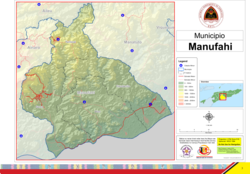Manufahi Municipality
You can help expand this article with text translated from the corresponding article in German. (July 2011) Click [show] for important translation instructions.
|
This article needs additional citations for verification. (February 2017) |
Manufahi | |
|---|---|
| |
 Landscape between Dili and Same | |
 | |
| Coordinates: 9°00′S 125°47′E / 9.000°S 125.783°E | |
| Country | |
| Capital | Same |
| Administrative posts | |
| Area | |
• Total | 1,332.5 km2 (514.5 sq mi) |
| • Rank | 6th |
| Population (2015 census) | |
• Total | 53,691 |
| • Rank | 11th |
| • Density | 40/km2 (100/sq mi) |
| • Rank | 11th |
| Households (2015 census) | |
| • Total | 9,023 |
| • Rank | 11th |
| Time zone | UTC+09:00 (TLT) |
| ISO 3166 code | TL-MF |
| HDI (2017) | 0.618[1] medium · 3rd |
| Website | Manufahi Municipality |
Manufahi (Portuguese: Município Manufahi, Tetum: Munisípiu Manufahi) is one of the municipalities of East Timor. It has a population of 53,691 (2015 census) and an area of 1,323 km2.[2] The capital of the municipality is Same.[3]
Etymology
[edit]The present name of the municipality, Manufahi, is derived from Maun Fahe, the Tetum language expression for 'divided brothers'. The name originated in a legend that tells of a fight between two related tribes, or a group of siblings. Eventually, the protagonists agreed to subject themselves to a single ruler.[4][5]: 67
During the Portuguese colonial era, the then district bore the name of its main town, Same. The present name was adopted on the basis of the divided brothers legend.[4][5]: 67 However, it was misspelled, and the Tetum language meaning of the misspelled name is 'pig chicken'.[4]
Efforts are being made to correct the name. However, there is also a legend that in the suco of Daisula a rooster once flew down from a mountain, landed on the back of a pig, and then travelled with the pig to many places before returning home.[4]
Geography
[edit]Manufahi extends from the central highlands of East Timor to its south coast, on the Timor Sea.[5]: 67 It is bordered by Manatuto to the east, Ainaro to the west, and Aileu to the north.
 |  |
History
[edit]According to a list prepared by Afonso de Castro, governor of the colony of Portuguese Timor from 1859 to 1863, Manufahi was one of 47 kingdoms in that colony at the time.[6]
During its time as a Portuguese colony, the municipality was called Same, after the capital city. It was the epicentre of the Great Rebellion of 1910–12. During the Indonesian occupation the then subdistrict of Hato-Udo was split off from the then district of Manufahi and joined to Ainaro, and the then subdistrict of Turiscai, previously in Ainaro, was moved to Manufahi.
Administrative posts
[edit]Manufahi's administrative posts (formerly sub-districts) are:[7]
Demographics
[edit]Besides the national official languages of Tetum and Portuguese, the Malayo-Polynesian language Mambai is also spoken.
References
[edit]Notes
[edit]- ^ "Sub-national HDI - Area Database - Global Data Lab". hdi.globaldatalab.org. Retrieved 13 September 2018.
- ^ "Timor-Leste Population And Housing Census 2015". Archived from the original on 31 December 2016. Retrieved 16 February 2018.
{{cite web}}: CS1 maint: bot: original URL status unknown (link) - ^ Lansell Taudevin (1999). East Timor: Too Little Too Late. Duffy & Snellgrove. ISBN 18-759-8963-3.
- ^ a b c d "Perfil: 2. Toponímia" [Profile: 2. Toponymy]. Manufahi Municipality (in Tetum). Retrieved 18 July 2022.
- ^ a b c Alongi, D; Amaral, A; de Carvalho, N; et al. (2012). River Catchments and Marine Productivity in Timor Leste: Caraulun and Laclo Catchments; South and North Coasts – Final Report (PDF). Project 6 of the Timor Leste Coastal-Marine Habitat Mapping, Tourism and Fisheries Development Project. Darwin: Ministry of Agriculture and Fisheries, Government of Timor Leste. ISBN 9781743500163.
- ^ "Timor Loro Sae: Um pouco de história" [Timor Loro Sae: A little history]. A.M.O.C. - Associação dos Militares do Oecussi (in Portuguese). Archived from the original on 13 November 2001. Retrieved 12 January 2025.
- ^ Gunn, Geoffrey C (2011). Historical Dictionary of East Timor. Lanham, Maryland: Scarecrow Press. p. 124–125. ISBN 9780810867543.
Bibliography
[edit]- Manufahi District Development Plan 2002–2003 (PDF) (Report). 2002. Archived from the original (PDF) on 28 March 2009. Retrieved 3 July 2022.
- Munisipio Manufahi: Planu Estartejiku Desenvolvimentu Munisipal [Manufahi Municipality: Municipal Strategic Development Plan] (Report) (in Tetum). Ministry of State Administration (East Timor) / Administration of Manufahi Municipality. 2015. Retrieved 18 July 2022.
- Perfil Distritu Manufahi [Manufahi District Profile] (PDF) (Report) (in Tetum). 2012. Archived from the original (PDF) on 3 March 2014. Retrieved 3 July 2022.
- Profil Distrik Manufahi [Manufahi District Profile] (PDF) (Report) (in Indonesian). April 2002. Archived from the original (PDF) on 28 March 2009. Retrieved 3 July 2022.
External links
[edit]![]() Media related to Manufahi at Wikimedia Commons
Media related to Manufahi at Wikimedia Commons
- Manufahi Municipality – official site (in Tetum with some content in English)
- Manufahi Municipality – information page on Ministry of State Administration site (in Portuguese and Tetum)


 French
French Deutsch
Deutsch
